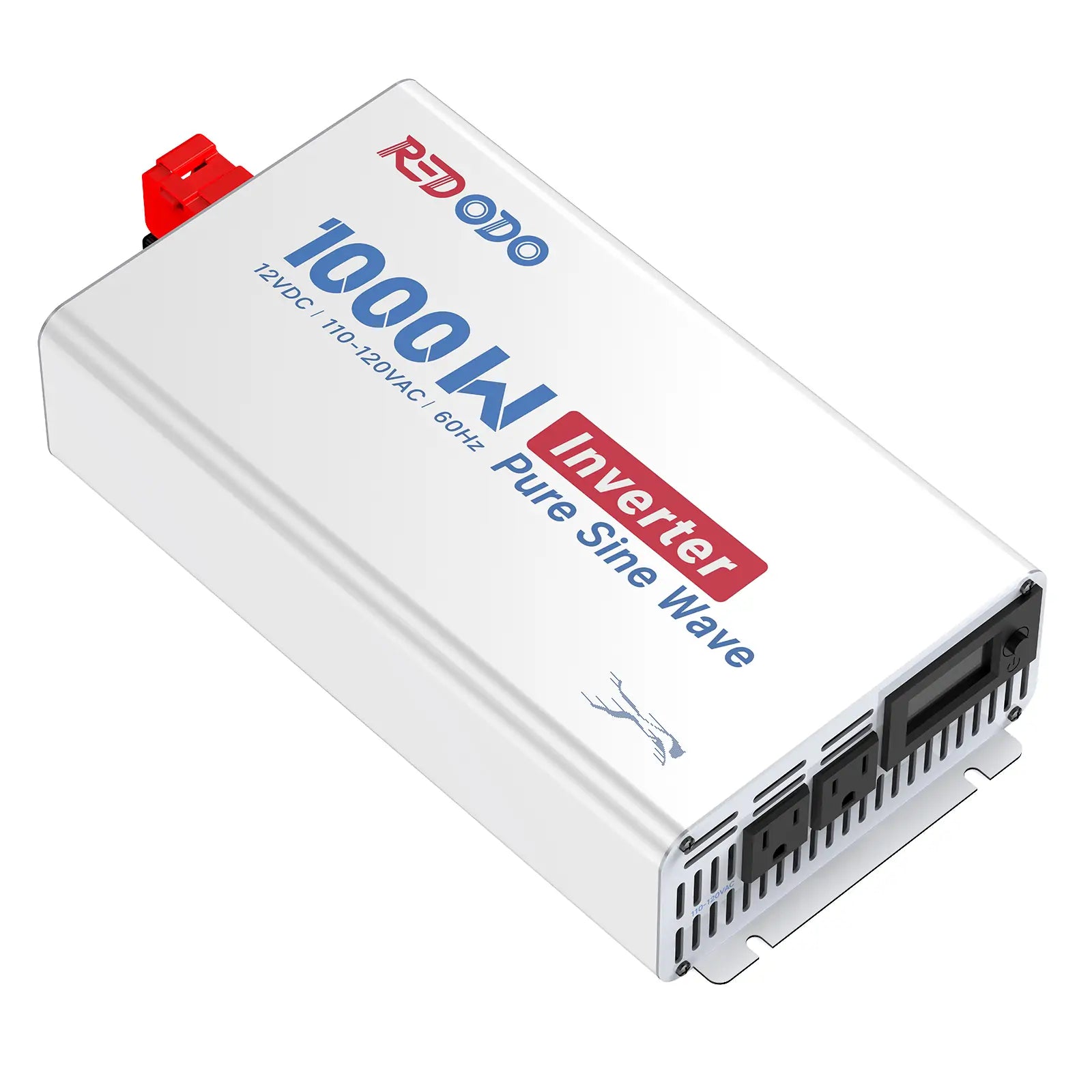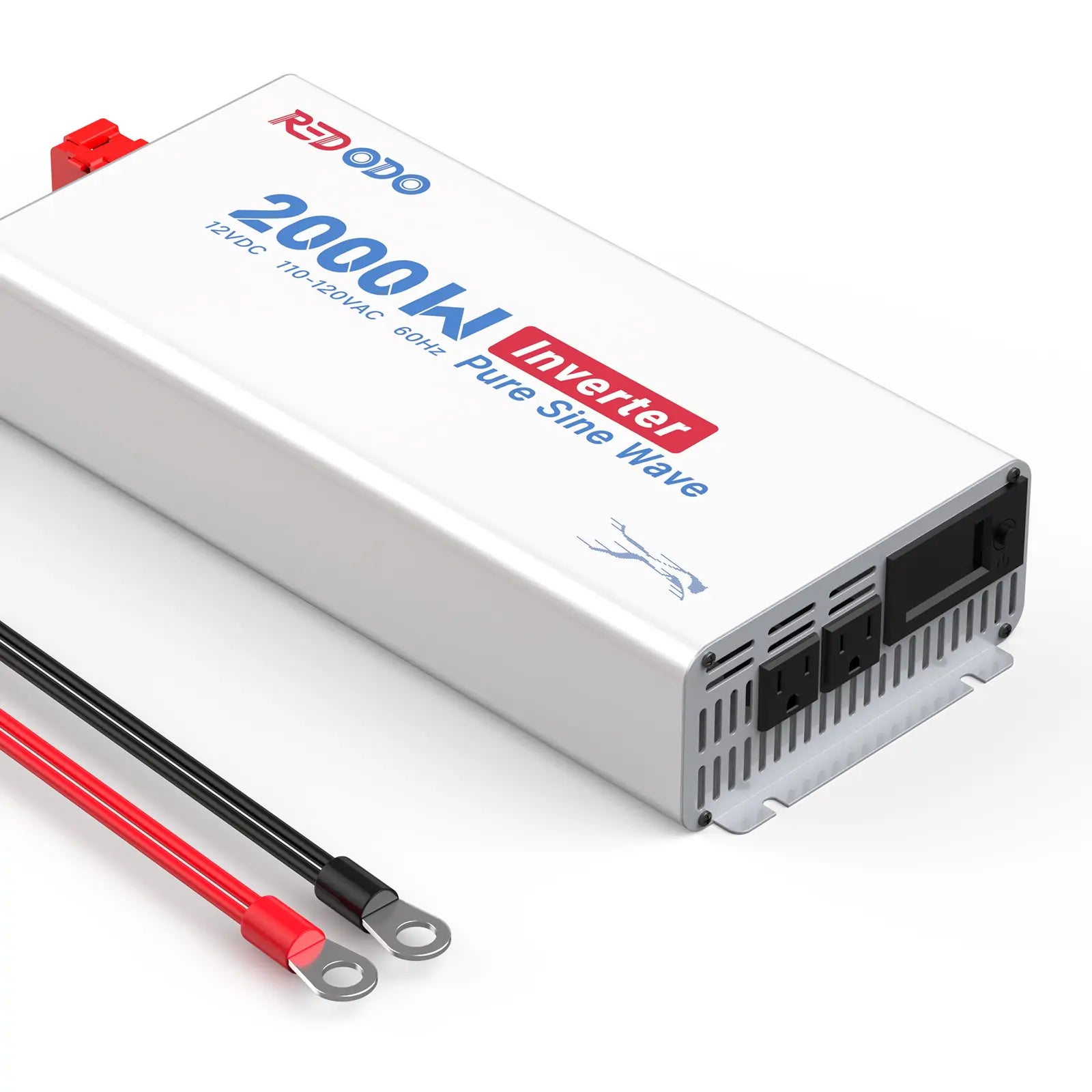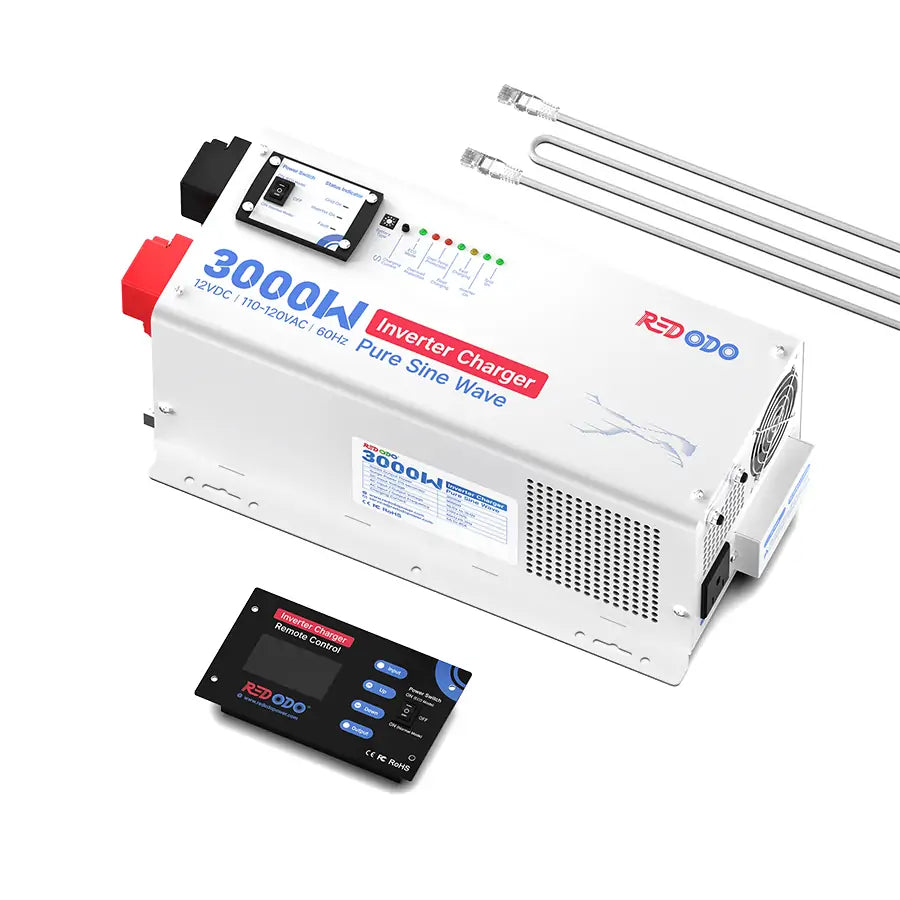As more homeowners embrace solar energy, having a reliable home backup battery becomes essential to ensure energy security during power outages. LiFePO4 deep cycle batteries play an important role at solar home backup systems.
In this article, we’ll help you navigate the options and show you how to choose the best solar battery for home, ensuring long-lasting performance and efficiency in your energy system.
Table of Content
How Do Solar Batteries Work?
Solar batteries store the excess energy generated by your solar panels during the day, so it can be used later when the sun isn’t shining, like during the night or on cloudy days.
Solar batteries typically store energy as direct current (DC), which is then converted to alternating current (AC) by an inverter for use in your home’s electrical system.
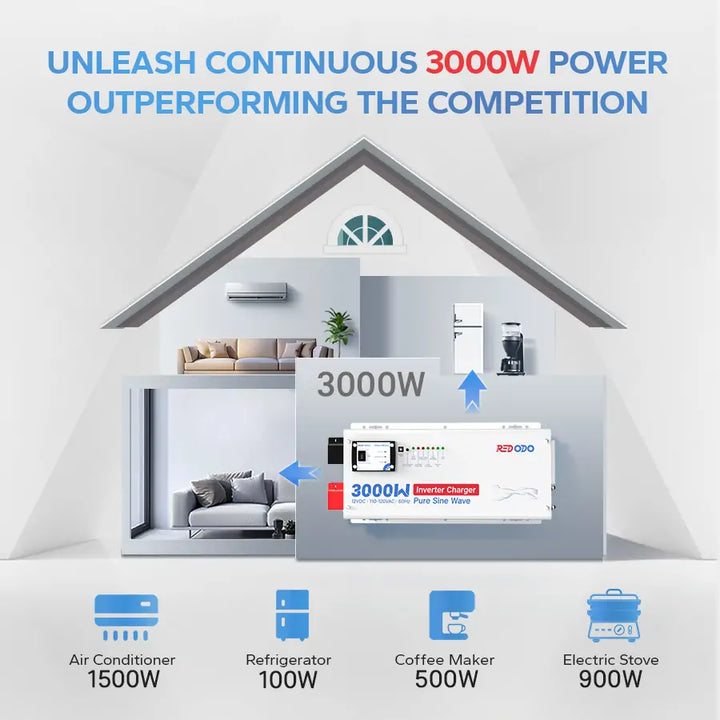
Redodo 3000 watt inverter
Which Battery is Best for a Solar Home Backup System and Why?
When it comes to choosing the best solar battery backup system for home, LiFePO4 batteries stand out as a top choice. These batteries offer several key advantages that make them ideal for solar applications:
Long Lifespan
LiFePO4 batteries are known for their long cycle life, often lasting up to 10 years with proper maintenance. Many models can endure over 4,000 charge cycles at 100% DOD like Redodo's.
High Efficiency
These batteries are highly efficient in storing and releasing energy, with round-trip efficiency rates of around 90-95%. This ensures minimal energy loss during storage and retrieval, maximizing the value of your solar power.
Safety
LiFePO4 batteries are inherently safer than other lithium-ion options due to the stable chemical composition, with a significantly lower risk of thermal runaway or overheating.
Deep Discharge Capability
LiFePO4 batteries can be discharged to 80-100% of their capacity without significantly reducing their lifespan. Lead-acid batteries, by contrast, typically can be discharged between 50%-80% to avoid damage.
Environmentally Friendly
LiFePO4 is a more eco-friendly option compared to other battery technologies, as it uses non-toxic, abundant materials. Additionally, its longer lifecycle reduces waste.
Pros and Cons of Solar Batteries
Before investing in a solar battery, it’s important to weigh the pros and cons to ensure it aligns with your energy needs and budget.
Pros:
Energy Independence
Solar batteries allow you to store excess energy for later use, reducing your reliance on the grid. This is especially valuable in areas with unreliable power or frequent outages.
Cost Savings
Over time, solar batteries can reduce your electricity bills by maximizing the use of your solar power and minimizing grid dependence. While the upfront cost is high, many homeowners see significant savings in the long run, especially if they live in regions with high electricity rates.
Sustainability
Solar batteries enable you to use clean, renewable energy even after the sun sets. This helps reduce your carbon footprint and supports a more sustainable lifestyle.
Flexibility
Solar batteries are a type of deep cycle batteries that can be widely used in RVs, boat trolling motors, and home backup, providing flexibility in different applications.
Cons:
High Initial Cost
Solar batteries, especially high-quality options like LiFePO4 batteries, the upfront cost can range from $500 to $4,000 even more. It depends on the number of solar batteries you need.
Limited Storage Capacity
While solar batteries are great for storing energy, they typically have limited storage compared to the energy consumption of an entire household. This means you may still need to rely on the grid during high-demand periods.
Slow Return on Investment (ROI)
The payback period for a solar battery can vary, but it generally takes 3-5 years to see a full return on investment.
Are Lithium Solar Batteries Worth It?
Yes, lithium solar batteries are worth it. Despite the higher upfront cost compared to lead-acid batteries, their longer lifespan and low maintenance requirements bring long-term benefits for most homeowners. Additionally, they perform better in extreme temperatures and are more environmentally friendly.
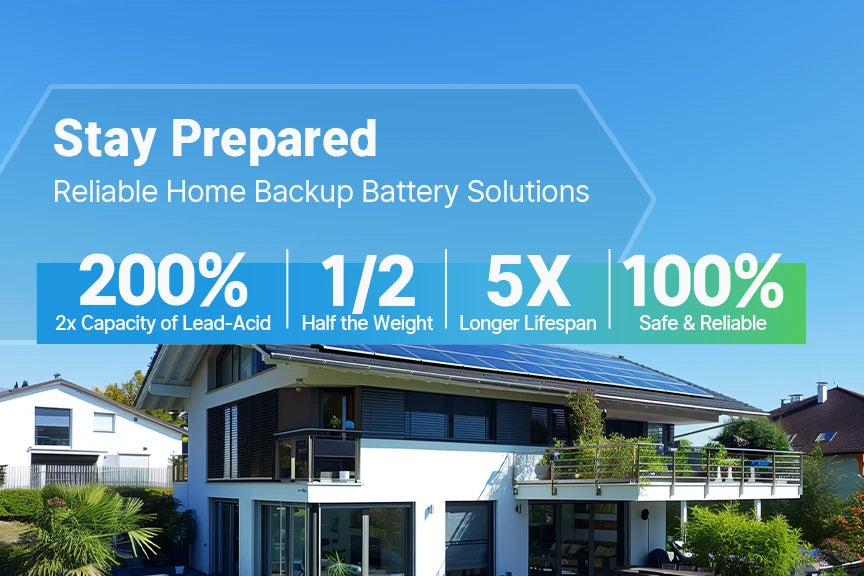
How to Choose the Best Solar Battery for Home?
Choosing the best home batteries for solar storage requires evaluating several factors to ensure it meets your energy needs and budget. Here are the key considerations to help guide your decision:
Energy Storage Capacity
The battery's storage capacity should match your energy usage and solar system sizesolar systems, consider pting for larger capacity batteries.
Battery Type
For most homeowners, LiFePO4 batteries are the ideal choice due to their superior efficiency, safety, and longevity. Lead-acid batteries, while cheaper upfront, offer shorter lifespans and require more maintenance.
Installation Space
Consider the space available for installation. Lithium batteries are typically smaller and more compact, making them easier to fit into tight spaces like garages or utility rooms. Ensure that the battery you choose can be installed conveniently in your home.
System Compatibility
Ensure that the battery you choose is compatible with your solar power system and inverter. Some solar batteries are designed specifically to work with certain types of inverters or solar panel brands, so it’s important to check for compatibility to avoid potential issues during installation.
Budget and Financial Incentives
Consider both the initial cost and long-term savings. While LiFePO4 batteries are more expensive upfront, their durability and minimal maintenance make them more cost-effective over time. Additionally, check for available rebates or tax incentives that could reduce the initial investment.
Best Battery for Solar Panel: Redodo 12V 140Ah Bluetooth Battery
The Redodo 12V 140Ah Lithium Battery with Bluetooth is perfect for off-grid solar systems, RV solar setups, and remote power stations, ensuring a dependable and efficient energy storage solution.
Key Features:
- High Capacity & Efficiency – With 1792Wh of stored energy, this battery provides ample power for solar setups, ensuring a stable energy supply even on cloudy days.
- Advanced Bluetooth Monitoring – Easily track battery status, cycle count, voltage, and current via the Redodo App, making system management more convenient.
- Reliable & Safe Performance – The built-in Battery Management System (BMS) offers overcharge, over-discharge, over-current, short-circuit, and high & low temperature protection, maximizing longevity and safety.
- Longer Lifespan – This LiFePO4 battery delivers 4000+ cycles, significantly outperforming traditional lead-acid batteries.
- Expandable for More Power –This battery supports series and parallel connections, allowing for up to a 51.2V 560Ah battery setup to meet larger solar power demands.
Best Battery for Home Backup: Redodo 12V 300Ah Lithium Battery
Ideal for home backup power, off-grid cabins, emergency preparedness, and whole-house energy storage, the Redodo 12V 300Ah Lithium Battery ensures you stay powered when it matters most.
Key Features:
- Massive Energy Storage – Offering 3840Wh of energy, this battery can power essential home appliances, medical equipment, or emergency lighting during power outages.
- Unmatched Durability & Safety – Built with EV-grade LiFePO4 cells, it ensures a longer lifespan (4000+ cycles) and stable performance, significantly reducing replacement costs over time.
- Faster & More Efficient Charging – This battery is compatible with solar panels, inverters, and traditional chargers, making recharging flexible and efficient.
- Compact & High Energy Density – Despite its high capacity, this 300Ah lithium battery is 83% lighter and 65% space saving than traditional lead-acid alternatives, making installation and handling easier while maximizing storage efficiency.
- Scalable Energy for Extended Backup – You can connect multiple Redodo 12V 300Ah batteries in parallel to expand capacity and support longer power outages or higher energy loads.
Get Reliable Solar Battery Solution from Redodo Now!
With their long lifespan, fast charging times, and safety features, Redodo solar batteries provide a sustainable and low-maintenance energy solution for home backup and solar panel. Choose Redodo for a dependable and efficient solar battery solution that will power your home for years to come!
FAQs on Solar Battery for Home
How many kWh battery for house?
A typical household in the U.S. uses about 30 kWh per day. For backup power and to store excess energy, a 10-15 kWh battery is a common choice.
How many batteries do you need to run a house on solar?
If you're using a 12V 100Ah lithium battery (which provides 1.28 kWh of usable energy per battery), you would typically need at least 5-8 batteries to cover the average daily energy needs of a typical household (10-15 kWh per day). With 2-3 batteries, you might only be able to provide backup power for a limited period, like overnight or during a cloudy day, but there's not enough solar batteries for powering a house.
Is a 10kW battery enough to run a house?
A 10 kW battery is generally sufficient to run a typical household for several hours, but it may not cover your entire daily energy consumption, especially if you use a lot of power. You might need additional solar lithium batteries or a larger system to fully rely on solar energy for your household.
How long will a 9.5 kWh battery last?
A 9.5 kWh battery will typically last for a full day of average use for a small to medium household. The duration can vary based on energy consumption, but most households will get around 8-12 hours of backup power from a 9.5 kWh battery.
Do you need a special solar panel to charge a lithium battery?
No, you don’t need a special solar panel to charge a lithium battery. However, you will need an appropriate solar charge controller that is compatible with both your solar panel and battery type to ensure safe and efficient charging.
Read More:
How to Charge LiFePO4 Batteries with Solar?
How to Charge Marine Battery With Solar Panel?
How Long Will a 100Ah Lithium Battery Run a 12V Fridge?

Redodo

Redodo
Recent Post

How Long Does a Trolling Motor Battery Last?

Convert RV from Lead-Acid to Lithium Battery: A Complete Guide

How Long Will a 200Ah Battery Run an Air Conditioner?

A Full Review of Redodo 12V 140Ah Group 31 Deep Cycle Battery

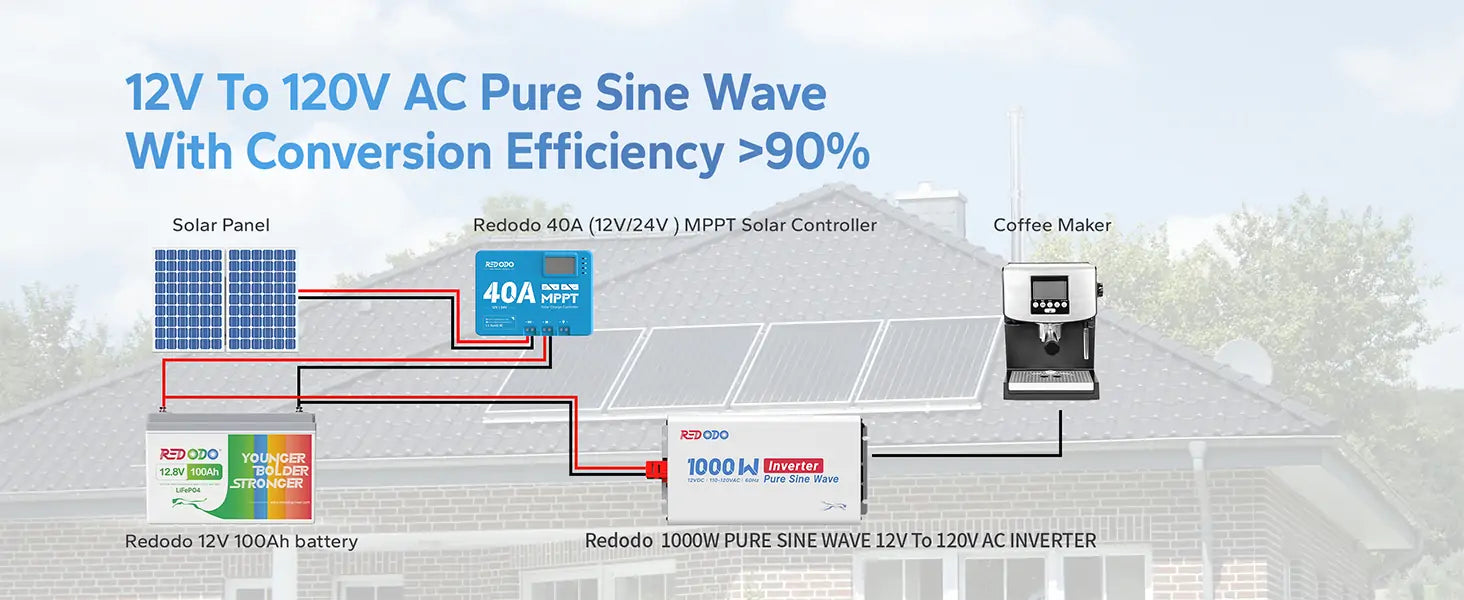
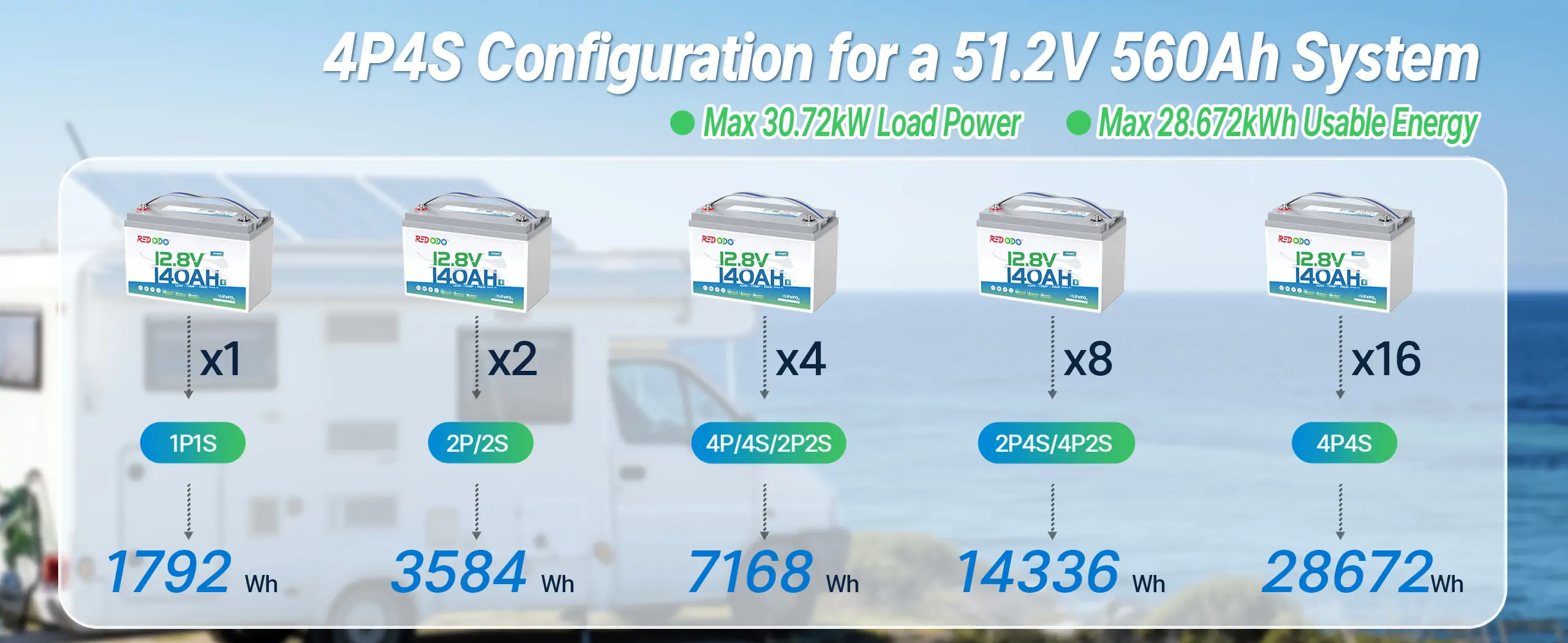
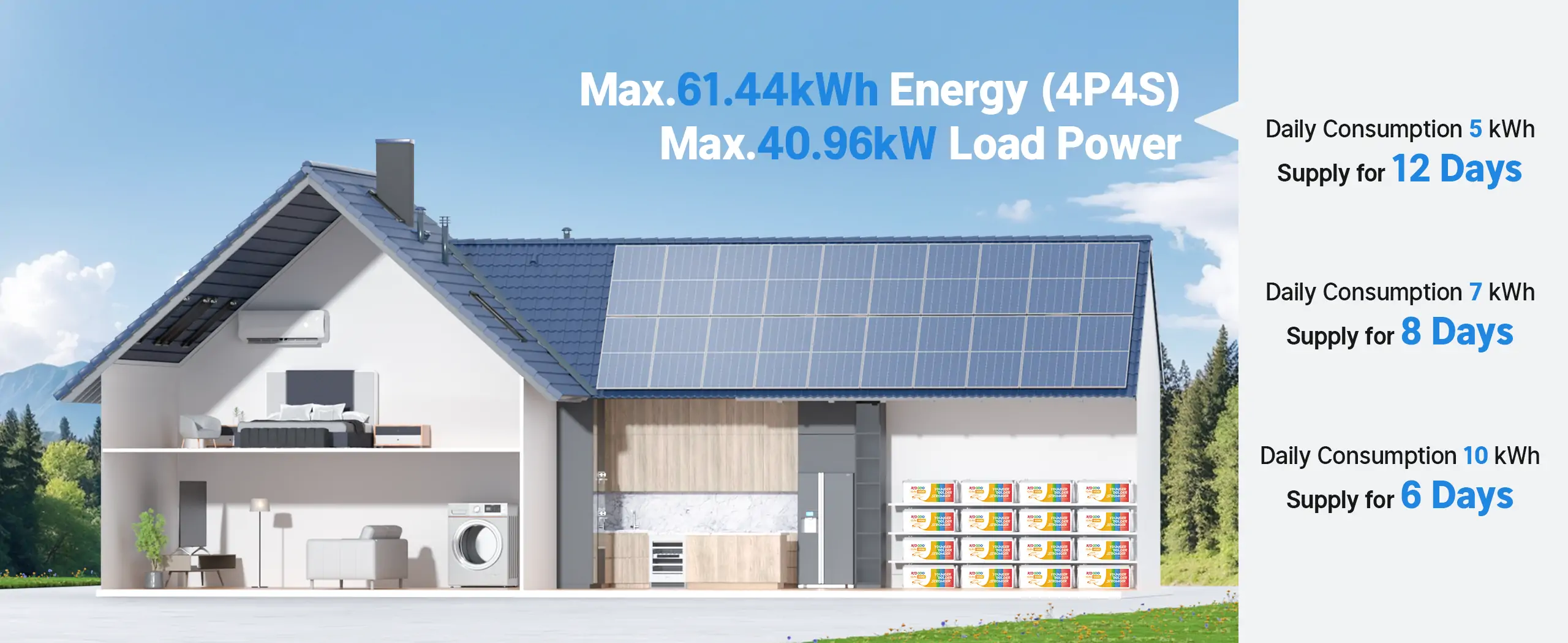
![⚡[$220 after Sign-Up] Redodo 12V 100Ah LiFePO4 Lithium Battery | Best Budget | For RV, Solar, Trolling Motor](http://www.redodopower.com/cdn/shop/files/Redodo_12v_100ah_lithium_battery_b9015ddd-64b5-4be2-8c88-392f0bb4ab30.jpg?v=1742973160)
![⚡[$294 after Sign-Up] Redodo 12V 140Ah Group 31 Lithium Battery with Bluetooth | 40% More Capacity | For RV, Marine, Solar Home](http://www.redodopower.com/cdn/shop/files/Redodo_12V_140ah_bluetooth_battery_ee6d5fd1-5c7d-4b9a-90ab-d54d06b29a04.jpg?v=1742967763)


![⚡[$524 after Sign-Up] Redodo 12V 300Ah Lithium LiFePO4 Battery | Replaces 6*12V 100Ah AGM Batteries | RV, Marine, Solar](http://www.redodopower.com/cdn/shop/files/Redodo_12V_300ah_lithium_deep_cycle_battery.png?v=1744797523)
![⚡[$947 after Sign-Up] Redodo 12V 410Ah Lithium LiFePO4 Battery | King of Power | Marine, RV, Solar Home](http://www.redodopower.com/cdn/shop/products/Redodo12V400Ahlithiumbattery-1.jpg?v=1736154087)
![⚡[$377 after Sign-Up] Redodo 12V 200Ah Lithium LiFePO4 Battery | 1280W Load Power | For RV, Solar, Off-Grid](http://www.redodopower.com/cdn/shop/files/Redodo12V200ahlithiumbattery.jpg?v=1735892910)
![⚡[$487 after Sign-Up] Redodo 12V 280Ah Bluetooth Lithium Battery | Low Temp Protection | For RV, Marine, Solar](http://www.redodopower.com/cdn/shop/files/Redodo-12V-280Ah-LiFePO4-Bluetooth-battery.jpg?v=1742812722)
